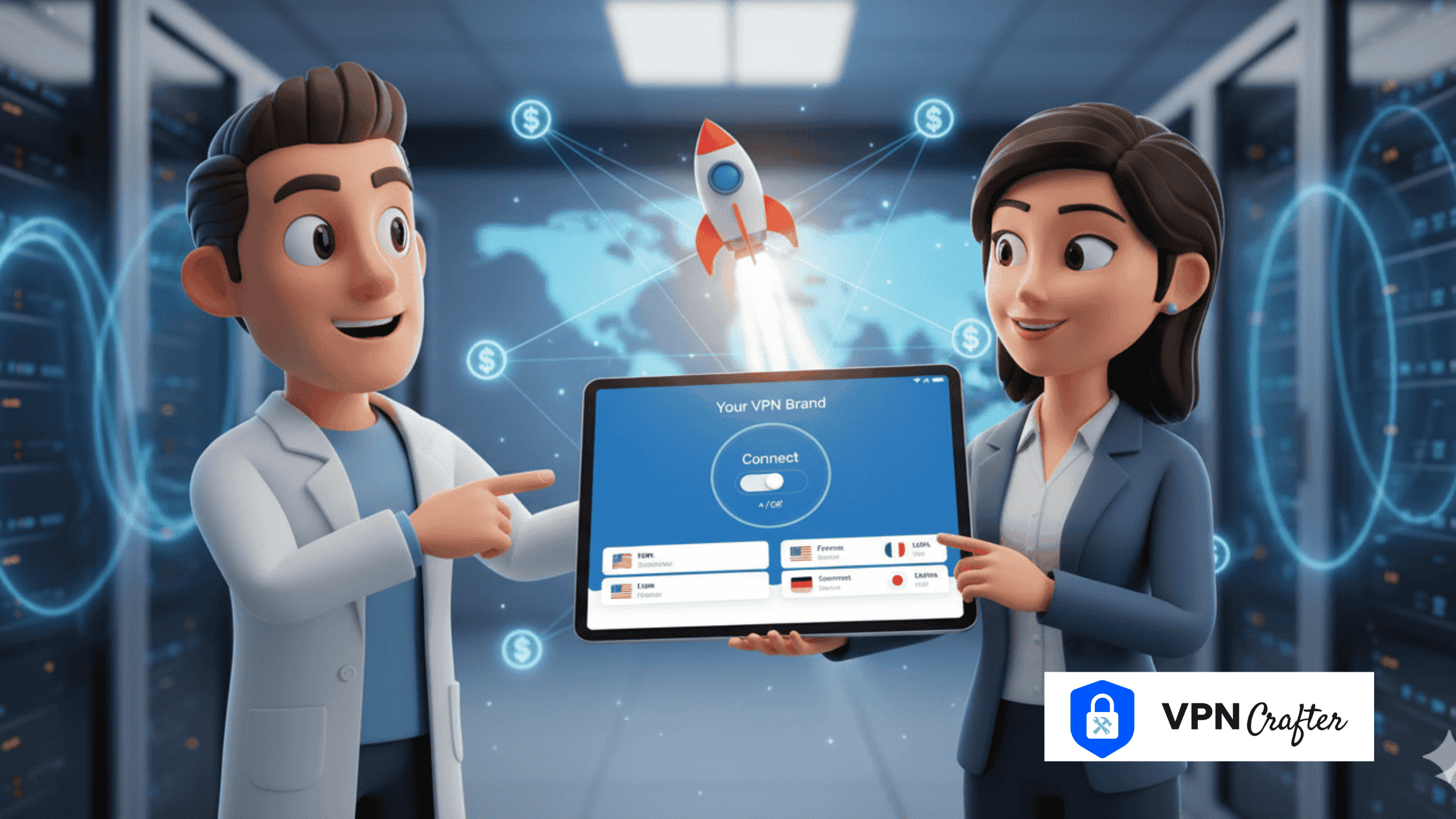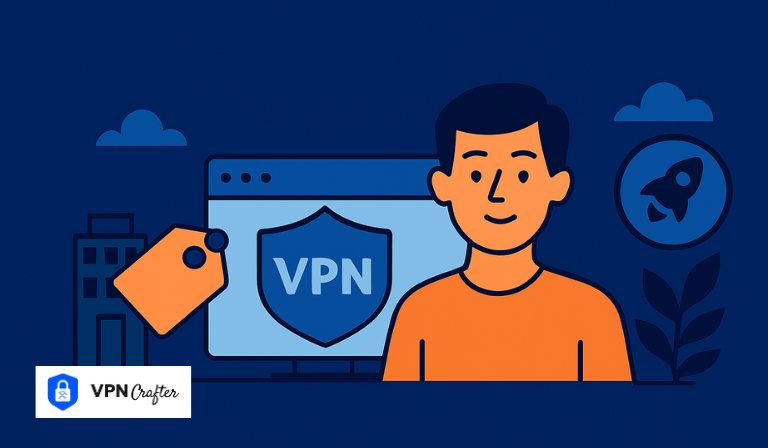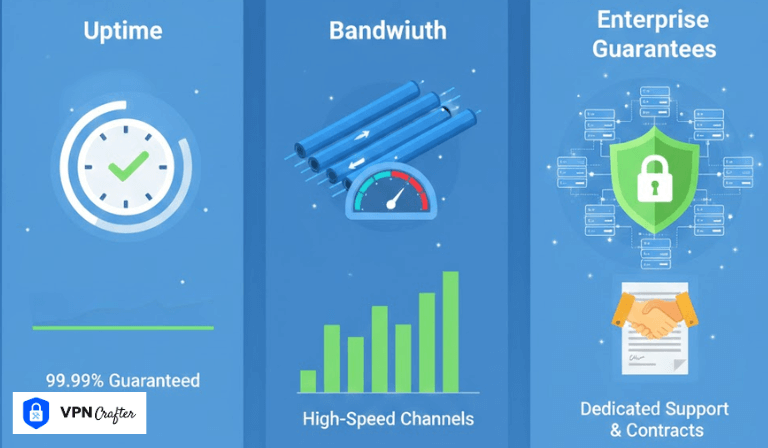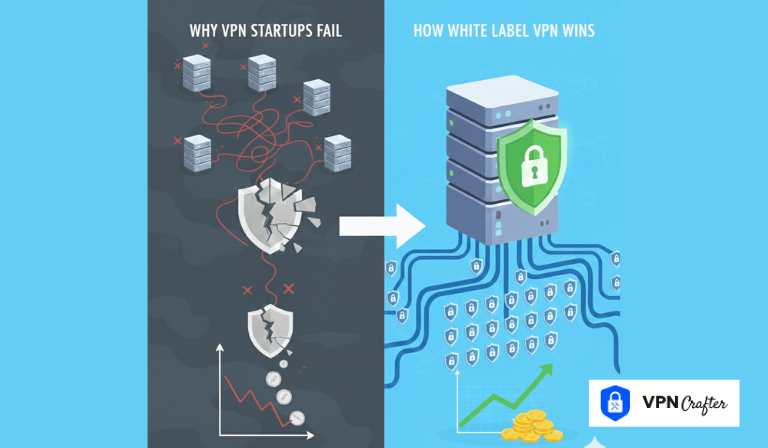In recent years, the demand for VPN apps has skyrocketed due to growing concerns around online privacy, censorship, and the surge of remote work. With cyber threats becoming more sophisticated, users are increasingly seeking secure ways to protect their data while accessing content globally.
According to recent market statistics, the global VPN market is expected to reach $150 billion by 2030, reflecting a compound annual growth rate of over 15%. This growth is fueled by privacy-conscious users, streaming enthusiasts bypassing geo-restrictions, and enterprises securing remote workforces.
Businesses and startups are now investing heavily in custom VPN app development to capture this expanding market. Offering a reliable, fast, and secure VPN app can create both a loyal user base and recurring revenue through subscription or freemium models.
This guide will walk you through everything you need to know about VPN app development, from architecture and protocols to security, monetization, and deployment strategies.
Understanding the Basics: What Is a VPN App?
A VPN app (Virtual Private Network app) allows users to create a secure connection between their device and the internet. By encrypting data and masking IP addresses, VPN apps provide users with privacy, security, and unrestricted access to geo-blocked content.
Core benefits of VPN apps include:
- Privacy: Prevents ISPs, governments, and hackers from tracking online activity.
- Security: Encrypts sensitive data, especially on public Wi-Fi.
- Access: Enables users to bypass regional restrictions for streaming and browsing.
How VPN apps work:
A VPN app typically follows a client–server encryption model, where the app on the user’s device (client) encrypts internet traffic and sends it to a secure VPN server. The server then decrypts and forwards the traffic to its destination, masking the user’s real IP address.
Popular VPN apps as examples:
- NordVPN – Known for fast speeds and multi-platform support.
- Surfshark – Affordable, unlimited devices, strong privacy features.
- ProtonVPN – Emphasizes security and a strict no-log policy.
How VPN Apps Work – Technical Overview
The technical backbone of a VPN app lies in encryption and tunneling protocols. These protocols ensure that user data remains private and secure while traveling across networks.
Common VPN protocols:
- OpenVPN: Open-source, highly secure, widely used for both mobile and desktop apps.
- WireGuard: Lightweight, high-performance protocol optimized for modern devices.
- IKEv2/IPSec: Fast, stable, and excellent for mobile devices with frequent network changes.
Data flows through VPN servers:
When a user connects to a VPN:
- The VPN app encrypts outgoing data.
- The data is transmitted to the VPN server.
- The server decrypts the data and forwards it to the intended destination.
- Responses from the server are re-encrypted and sent back to the user.
Additional security layers:
- DNS Leak Protection: Prevents IP and DNS exposure.
- Kill Switch: Immediately disconnects the internet if the VPN drops, maintaining security.
Diagram suggestion: “How a VPN routes user data securely” — visualize encrypted tunnels between client and server with DNS and kill switch safeguards.
Planning Your VPN App – Pre-Development Strategy
Before writing a single line of code, careful planning ensures your VPN app meets user needs and complies with regulations.
Define your target audience:
- Personal privacy users
- Corporate remote teams
- Streaming and geo-unblocking enthusiasts
White-label vs. custom VPN development:
- White-label: Faster launch, pre-built server infrastructure, limited customization.
- Custom VPN: Full control, unique features, better scalability, but higher cost and development time.
Compliance considerations:
- GDPR and CCPA compliance for user data.
- Local data retention laws depend on server location.
Monetization models:
- Subscription-based: Monthly/annual plans.
- Freemium: Limited free plan with paid upgrades.
- Ad-supported: Generates revenue through in-app advertising.
VPN App Architecture & Components
A robust VPN app requires a well-planned architecture to ensure performance, security, and scalability.
Core components:
- VPN Client: Mobile apps (iOS, Android), desktop apps, and browser extensions.
- VPN Servers & Backend: Distributed servers for fast connections and redundancy.
- Authentication & Encryption: Secure login mechanisms and AES-256 encryption for traffic.
- API Management & Protocols: Integration with OpenVPN, WireGuard, or custom APIs.
- Scalability Options: Cloud hosting via AWS, Google Cloud, or DigitalOcean to handle traffic spikes.
Choosing the Right Tech Stack for VPN App Development
Selecting the right tech stack is critical for performance, security, and maintainability.
Programming languages:
- Kotlin – Android app development.
- Swift – iOS app development.
- Go or Python – Backend server logic and networking.
VPN libraries & SDKs:
- OpenVPN SDK for client-server integration.
- WireGuard SDK for lightweight, high-speed connections.
Backend frameworks:
- Node.js – Real-time server management.
- Django or Golang – Secure backend APIs.
Databases & hosting:
- SQL/NoSQL databases for user and session management.
- Cloud servers (AWS, GCP, DigitalOcean) for global coverage.
Integration tools:
- Stripe or PayPal for subscription management.
- Firebase for analytics and push notifications.
- Monitoring tools for uptime and latency tracking.
Security Essentials in VPN Development
Security is the core of any VPN app development project. Users rely on VPN apps to protect sensitive information, so robust security measures are non-negotiable.
Key security practices:
- Data Encryption Standards: Use AES-256 for traffic encryption and SSL/TLS for client-server communication.
- No-Log Policy: Ensure your app does not store or track user activity. Transparency builds trust.
- DNS Leak Protection & Kill Switch: Prevent accidental IP exposure and secure user data even if the VPN drops.
- Multi-Hop & Obfuscation: For regions with strict internet restrictions, multi-hop routing and obfuscation enhance privacy.
- Regular Security Audits & Penetration Testing: Frequent testing ensures vulnerabilities are identified and mitigated promptly.
Prioritizing these elements ensures your VPN app meets industry standards and protects users effectively.
Step-by-Step VPN App Development Process
Building a VPN app requires a structured approach to ensure reliability, speed, and security.
Step 1: Research & Architecture Design
- Define app objectives, target audience, and core features.
- Plan server architecture, protocol selection, and backend infrastructure.
Step 2: UI/UX Design
- Focus on simplicity and clarity.
- Ensure users can connect, disconnect, and manage servers effortlessly.
Step 3: Backend Server Setup
- Deploy VPN servers across multiple regions.
- Set up load balancing and redundancy to handle peak traffic.
Step 4: Protocol Integration & Encryption Testing
- Implement OpenVPN, WireGuard, or IKEv2/IPSec protocols.
- Test encryption, latency, and connection stability.
Step 5: App Deployment & QA
- Conduct functional, security, and performance testing.
- Launch beta versions to collect user feedback.
Step 6: Maintenance & Updates
- Monitor server health, update protocols, and patch security vulnerabilities.
- Release regular updates to enhance performance and user experience.
Cost of VPN App Development (2025 Breakdown)
VPN app development cost varies widely based on complexity, team location, and server infrastructure.
Factors influencing cost:
- Team size (developers, designers, security experts).
- Number of platforms (iOS, Android, desktop).
- Features (protocol support, multi-hop, obfuscation).
- Server network (number of servers, global coverage).
Estimated range:
- Basic VPN app: $20,000–$50,000
- Enterprise-grade VPN app: $80,000–$200,000+
Cost-saving tips:
- Start with a minimal viable product (MVP).
- Use white-label server solutions initially.
- Leverage cloud hosting for scalability without upfront server costs.
VPN App Monetization Strategies
A well-planned monetization strategy ensures ROI on your VPN app development investment.
Popular models:
- Subscription Tiers: Monthly/annual premium plans.
- Freemium Model: Limited free features, with paid upgrades for unlimited access.
- Affiliate Programs: Partner with content providers or tech platforms.
- Ad-Supported Model: Display ads to free users (careful to avoid intrusive UX).
- Upselling Premium Servers: Offer faster connections or dedicated IPs for additional fees.
The right mix of strategies depends on your audience and app positioning.
Challenges in VPN App Development
Developing a VPN app comes with technical and operational challenges:
- Latency & Bandwidth: High traffic can slow connections; optimized server networks are essential.
- Cross-Platform Compatibility: Ensuring consistent performance on iOS, Android, and desktops.
- App Store Policy Restrictions: Some VPN apps face additional scrutiny on Google Play and App Store.
- User Trust & Compliance: Maintaining privacy standards while adhering to international data laws.
Anticipating these challenges early helps avoid costly rework later.
Testing & Launching Your VPN App
Thorough testing is critical to ensure your VPN app is secure, fast, and reliable.
Testing practices:
- Performance & Load Testing: Check server performance under peak load.
- Security Testing: Penetration tests to identify vulnerabilities.
- Beta Testing: Collect feedback from early users to improve usability.
Launching your app:
- Deploy on Google Play and Apple App Store with proper ASO (App Store Optimization).
- Optimize keywords like “VPN app,” “secure VPN,” and “privacy VPN app” for visibility.
Post-Launch Maintenance & Scaling
Once live, maintaining server stability and updating your VPN app is crucial:
- Monitor server performance: Track latency, uptime, and connection reliability.
- Regular Updates: Update encryption protocols and security patches.
- Customer Support: Provide quick resolutions for connection or subscription issues.
- Scale Infrastructure: Add new servers and expand coverage geographically as demand grows.
Scaling ensures your VPN app remains competitive in a growing market.
Hiring a VPN App Development Company (If You’re Outsourcing)
If you plan to outsource VPN app development, choose a partner carefully:
What to look for:
- Proven experience in VPN or security app development.
- Knowledge of encryption protocols, server setup, and backend security.
- Ability to deliver cross-platform apps (iOS, Android, desktop).
Questions to ask:
- Who owns the source code?
- How is user data secured?
- Will they provide maintenance and updates?
Checklist: NDA, clear deliverables, and a roadmap for future scalability.
Conclusion – Building a Future-Ready VPN App
Creating a VPN app requires technical expertise, strong security practices, and careful planning. Focus on:
- Secure encryption and no-log policies.
- Scalable architecture for global users.
- Transparent monetization and user trust.
The VPN industry is evolving, with AI-driven routing and privacy-first solutions shaping the future.





